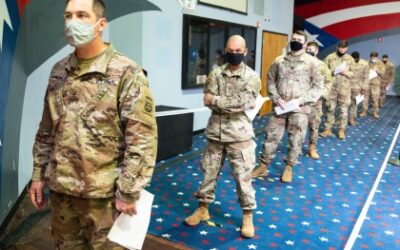Although serious allergic reactions to mRNA vaccines are extremely rare, fear of them has driven hesitancy among some potential recipients. That especially has been the case when an adverse effect occurred after the first dose.
VA Further Postpones Electronic Health Record Rollout to New Facilities
VA has postponed the rollout of its new electronic health record (EHR) system to new facilities, including to Boise, ID, where it had been scheduled to go live last month.
Ho Seeks to Reduce Barriers to Care—Inside and Outside VA
Michael Ho, MD, PhD, a staff cardiologist at VA Eastern Colorado Health Care, has spent much of his professional career studying how veterans access VA and the barriers that might stand in their way.
MHS Researchers Found Current Antibiotic Dosing Guidelines Adequate for Critically Ill Patients With Trauma, Burn
Critical illness caused by burn and sepsis doesn’t alter how the body processes piperacillin and tazobactam (pip-tazo), an antibiotic and beta-lactamase inhibitor drug combination
Cost of VA-Reimbursed Community Care Is Rising Dramatically
Between FY 2017 and FY 2021, VA spending on community care rose from $10.1 billion to $21.8 billion–a 116% increase that does not factor in the costs of administering the program. At the same time, VA spending on healthcare in its own facilities grew 32%.
Chronic Traumatic Encephalopathy Is Uncommon in Brains of Military Personnel
Military personnel exposed to attacks with high explosives frequently experience neuropsychiatric symptoms, including cognitive dysfunction, behavioral changes, mood disturbances and suicidality.
Severe Staffing Shortages Are Again Increasing at VA Medical Facilities
After years of improvements, severe staffing shortages are back on the rise at VA. According to a VA Office of the Inspector General (OIG) report released last month, fiscal year 2022 put an end to a three-year staffing improvement
New Legislation Gives VA Inspector General More Investigative Clout
Two pieces of new legislation would provide VA’s Office of the Inspector General with greater investigative power and employees with a better understanding of how OIG works and what their responsibilities are when asked for assistance by investigators.
VA Liquid Biopsy Study Aims to Screen 10,000 Veterans for Cancer
Veterans comprise nearly one-third of the participants in a major study evaluating a multi-cancer, early-detection blood test.
VA Makes Efforts to Respond to Healthcare Workers’ High Levels of Stress
As VA employees are reporting increasing levels of burnout, and the department is facing its highest turnover rate in decades, VA has tried to put systems in place to support staff mental and emotional health.
Concerns Raised Again About VA’s Widespread Cybersecurity Deficits
For the past four years, the annual Federal Information Security and Modernization Act (FISMA) audit has warned that the VA has lingering deficiencies across a wide range of cybersecurity areas, from agency wide security management programs to incident reporting and identity management.
Telemedicine Effective for Parenteral Chemotherapy Administration at VAMC
With patients in rural Nebraska who have trouble accessing the primary campus in Omaha, the VA Affairs Nebraska Western Iowa Health Care System (VA-NWIHCS) is using teleoncology and remote chemotherapy services to expand care to those veterans.
VA Tries to Address Societal Factors Leading to Veteran Suicides
For decades, VA’s response to preventing veteran suicide has been focused almost exclusively on healthcare, specifically mental healthcare.
Medications Might Skew Testing in One-Third of Older Vets With Hypothyroidism
Clinicians can find it difficult to manage hypothyroidism in older veterans, who tend to have a greater likelihood of adverse effects because of comorbidities, polypharmacy or both.
Veterans With CLL/SLL Have Suboptimal Adherence to New Therapies
Suboptimal adherence to new therapies for chronic lymphocytic leukemia (CLL)/small lymphocytic leukemia (SLL), as well as related costs and healthcare resource use, demonstrate unmet needs in real-world treatment of the blood cancers, according to a new review.
Military/VA Search for New, Nonopioid Methods to Combat Chronic Pain
The last decade has seen health systems the world over shift away from using opioids for pain management. First there was the too-slow understanding that opioids are addictive and were being massively over-prescribed.
Depression Can Affect Dual-Task Walking in Multiple Sclerosis
Dual-task walking (DTW) can be a complex process for multiple sclerosis patients. A new study looks at what functions it requires.
MS Patients With RRMS Have More Anxiety Than Those With PMS
Multiple sclerosis patients in general appear to have higher rates of anxiety than the general population, but it remains unclear how much their disease course affects that response.
Community Care Coordination Puts Strain on VA Staff, Finances
Since 2014, when Congress passed the Veterans Access Choice and Accountability (Choice) Act, the VA has been paying for U.S. veterans to receive increasing amounts of private sector, non-VA, care.
Comorbidities Predict ED Use by Veterans With MS
Would addressing comorbidities in multiple sclerosis patients help reduce use of all-cause emergency services?
Cost of Community Care Has Risen Faster Than In-House VA Medical Care
President Joe Biden’s fiscal year 2023 budget request for VA totals $301.4 billion—an 13.3% jump from the FY22 enacted levels. This is in addition to an FY24 Advanced Appropriations request totaling $287 billion.
VA Researchers Identify Key Factor in ACCORD’s Increased Mortality
Optimal diabetes management requires striking a careful balance. Over time, high blood glucose levels impair cardiovascular function, leading to delayed wound healing, heart disease and elevated risk of stroke.
Is Heart Rate Variation an Accurate Biomarker for PTSD?
Could heart rate variability be an indicator of when a form of transcranial magnetic stimulation would be effective in treating post-traumatic stress disorder?
Pandemic Worsened Outcomes of Out-of-Hospital Cardiac Arrest
Outcomes of out-of-hospital cardiac arrest appears to have worsened, not only nationally but also at the state level, according to a new study focusing on Texas.
Height Might Be a Risk Factor for Several CV Conditions
Height appears to be an unrecognized non-modifiable risk factor for several common conditions in adults, according to a study using data from the VA Million Veteran Program.
Facility Performance Metrics Unavailable With Spokane EHR Rollout
When VA’s new electronic health record (EHR) went live at the Mann-Grandstaff VAMC in October 2020, the system did not have the metrics in place to allow the hospital to measure how the facility was performing, according to a recent study released by the VA Office of the Inspector General.
Economic Burden of PTSD Is ‘Staggering,’ New Treatments Needed
PTSD can have a profound effect on quality of life and emotional well-being. Symptoms such as nightmares, difficulty sleeping or concentrating, as well as thoughts of self-harm can continue or reemerge throughout life.
Increased Risk of Cardiovascular Mortality in U.S. Veterans Linked to Over- and Under-Treatment With Thyroid Hormones
Both over-treatment and under-treatment with synthetic thyroid hormones are associated with an increased risk of cardiovascular mortality in U.S. veterans, according to a new study.
Prescribing of Antipsychotic Medications for Dementia Dropped Overall at
VHA nursing homes are prescribing fewer antipsychotic and anxiolytic (anti-anxiety) medications for dementia patients, but the overall prescribing of other psychotropic and opioid medications increased, according to a new study.
VA Researcher Focuses on How to Prevent Staff Burnout at VA
For the past five years, Kara Zivin, PhD, MS, MA, has been “chasing burnout,” working to understand what causes it, how to measure it and what are the truly impactful measures that a healthcare system can take to combat it.


